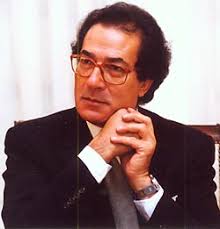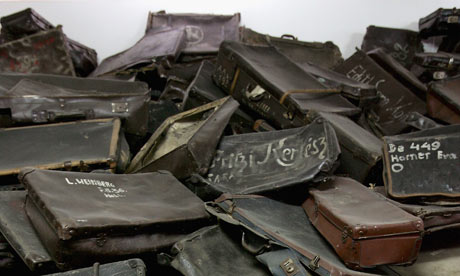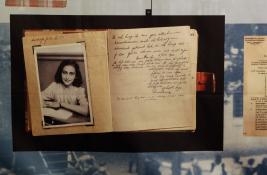
Dr. Deborah Lipstadt
spoke two weeks ago at the Harvard Hillel addressing the recent controversy surrounding the University's
Crimson newspaper. In early September, the
Harvard Crimson ran an ad bought by longtime Holocaust denier Bradley Smith. The advertisement
challenged readers to "provide, with proof, the name of one person killed in a gas chamber at Auschwitz."
In her talk, Lipstadt emphasized that “Deniers are not a point of view ...They are liars and falsifiers of history. Deniers take the data and twist it and turn and distort it.”
She also focused on the various insidious ways that deniers spread their message, pointing to "soft-core denial" as a particularly poignant example. According to the
Crimson write up of her talk:
Lipstadt also discussed what she called “soft-core Holocaust denial,” a new form of denial in which the Holocaust “gets mixed up with other things” and is “used as a misrepresentation.” As an example, she cited the comparison of George W. Bush to Hitler, which she said suggested an implicit denial of the Holocaust.
“To compare [Bush] to Hitler is to turn history on its head,” said Lipstadt.

Just a week earlier and 20 miles outside Harvard, in the Boston suburb of Framingham, an infamous immigrant-basher named Jim Rizoli demonstrated Lipstadt's point in spectacular fashion. Long a racist and bigoted critic of Brazilian immigrants in Framingham, Jim showed that xenophobia, antisemitism and Holocaust denial are two sides of the same coin when, he took 10 minutes out of his hour-long public access show to praise Mahmoud Ahmadinejad and to minimize the numbers of Holocaust dead.
According to an
ADL report, Rizoli defended Ahmadinejad, claiming that "he has never read anything where the Iranian leader denied that the Holocaust happened, that he only 'has some issues with the way the whole thing went down.' Rizoli then commented, 'Just like I do.'" What "thing" went down in a way that Rizoli takes issue with? This type of oblique reference to an unidentified manipulation of history is typical of "soft-core denial," in that it attempts to minimize the Holocaust through slander rather then historical argumentation.
Yet Rizoli did not stop there. After announcing his intention to launch into a "controversial topic," Rizoli told his viewers that they'd "been brainwashed for the last 50 years on the [Holocaust] propaganda." A summary of Rizoli's diatribe on
Boston.com, has him parroting one of the most persistent deniers claims, he insisted that "more Christians lost their lives than Jews, only around 300,000 people died, not six million, and that the majority were not killed but 'died of sickness and disease.'"
This association of xenophobia, antisemitism and Holocaust denial relates perhaps to the same hatred of the other. In today's world, this is often expressed as an insistence that one's own group, in Rizoli's case white Christians, has suffered more than any other group and therefore deserves to be appeased, left alone, left unchallenged. Yet, the oft-repeated Holocaust mantras "never forget" and "never again" mean nothing if not that we must remain vigilant in the face of intolerance and hatred. Rizoli reminds Jews (as if any reminder was necessary) that in almost every case, hatred of the other is accompanied by or birthed from the hatred of Jews.
*******Update*********
A local Framingham
paper reported today that Rizoli claims to have lost 70% of his carpet-cleaning clientele, and an important membership in a client referral service since this story broke. He insists that his business is being ruined by "the Zionists in the Jewish community. They spread their little rumors. The Zionists are radical crazy, hysterical people." He added that "This is how
they deal with you."


 Just a week earlier and 20 miles outside Harvard, in the Boston suburb of Framingham, an infamous immigrant-basher named Jim Rizoli demonstrated Lipstadt's point in spectacular fashion. Long a racist and bigoted critic of Brazilian immigrants in Framingham, Jim showed that xenophobia, antisemitism and Holocaust denial are two sides of the same coin when, he took 10 minutes out of his hour-long public access show to praise Mahmoud Ahmadinejad and to minimize the numbers of Holocaust dead.
Just a week earlier and 20 miles outside Harvard, in the Boston suburb of Framingham, an infamous immigrant-basher named Jim Rizoli demonstrated Lipstadt's point in spectacular fashion. Long a racist and bigoted critic of Brazilian immigrants in Framingham, Jim showed that xenophobia, antisemitism and Holocaust denial are two sides of the same coin when, he took 10 minutes out of his hour-long public access show to praise Mahmoud Ahmadinejad and to minimize the numbers of Holocaust dead.



